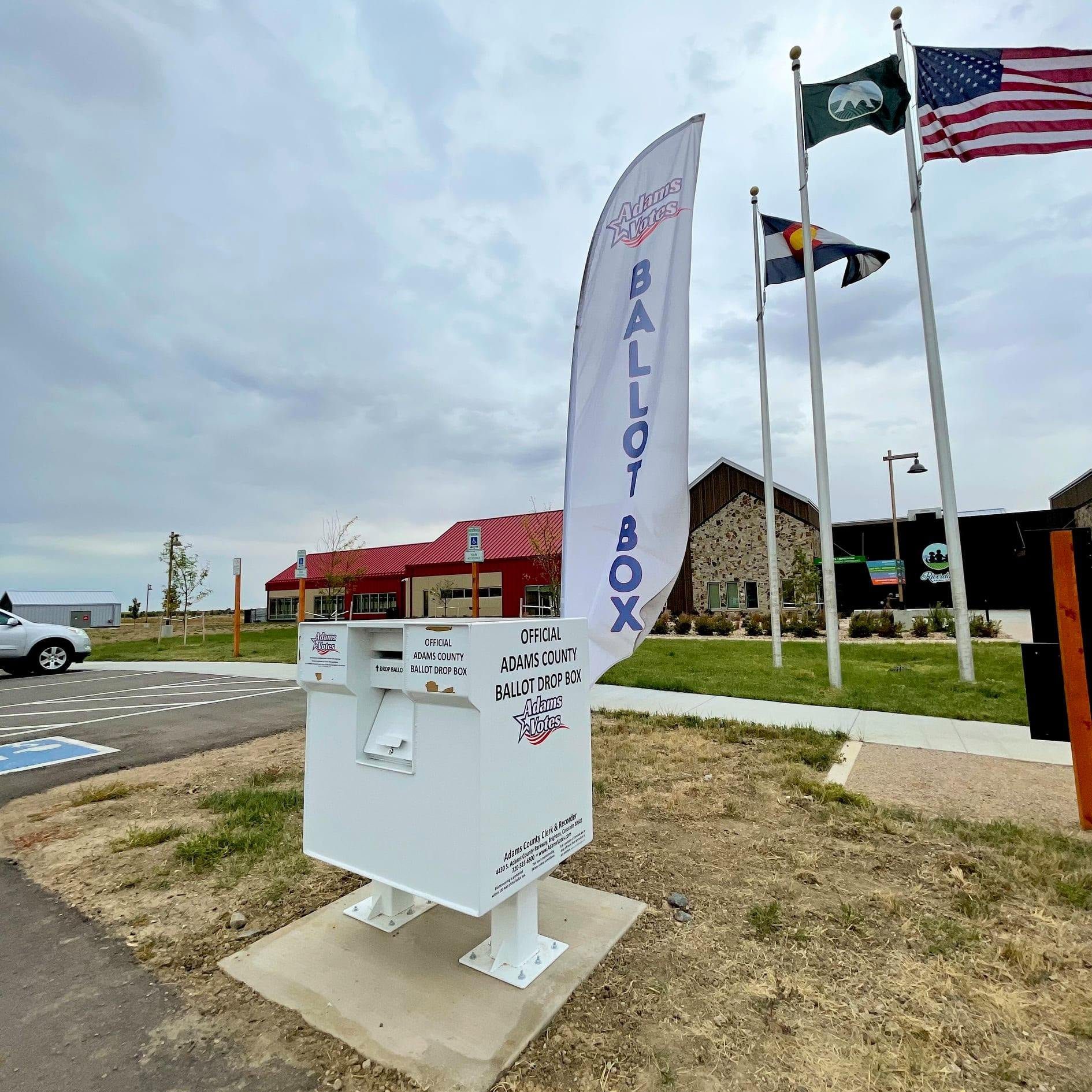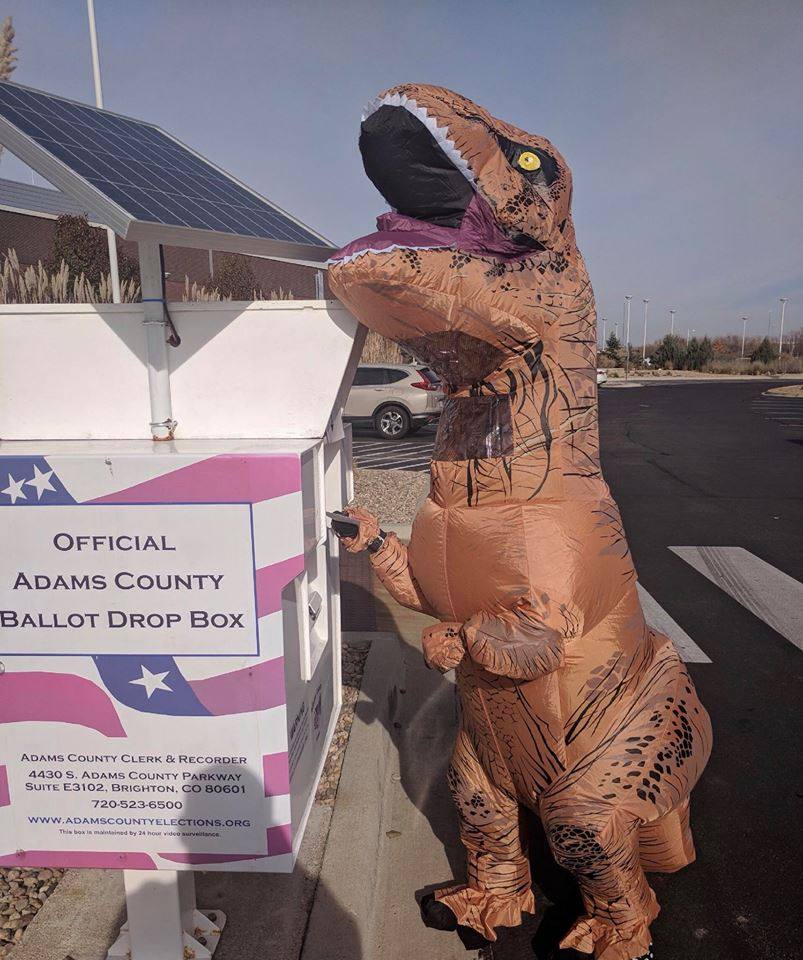Election Deniers Are Running to Take Over Colorado Election Offices
Candidates up and down the ballot are sowing doubt about the 2020 election while also seeking elected offices that administer voting in the state.
Camille Squires | June 27, 2022


Update: Tina Peters, Peter Lupia, and Julie Fisher all lost their Republican primaries on June 28. Karen Hoopes moved on to the general election in Adams County.
A Colorado county clerk who espouses Donald Trump’s lies about the 2020 election was indicted in March for tampering with voting equipment. Tina Peters is alleged to have given an unauthorized person access to voting-machine data and leaked passwords in an effort to promote Trump’s bogus claims that the presidential election was stolen from him. But Peters was far from deterred: She is now challenging the Democratic secretary of state and running to become Colorado’s chief elections official.
Peters, who faces her first test in Tuesday’s Republican primary, is only the tip of the iceberg when it comes to election deniers running in Colorado this year. Further down the ballot, Republicans who echo the same conspiracy theories are now seeking positions as county clerks across the state, a Bolts survey of local elections shows.
If they are successful, these candidates would gain power over critical offices that run elections in Colorado. They are part of a movement of election deniers attempting to seize election offices nationwide. Some have already secured the Republican nomination in high-profile statewide elections, from Pennsylvania governor to Nevada secretary of state.
The thousands of local officials who run elections at the local and county levels have become a crucial though less visible battleground given their authority over registration, counting, canvassing, and other processes. And no state is more emblematic of this battle than Colorado, given Peters’s willingness to use her platform as clerk to combat the 2020 results and her attempt to now seek higher office.
Whether similar efforts to interfere with election procedures occur after the 2022 midterms could come down to what voters decide this year in some of Colorado’s most populous counties. At least one Republican who questions the result of the 2020 elections is already certain to be in the general election for clerk in suburban Adams County. Other clerk candidates who are aligned with the Big Lie, the set of debunked claims that the 2020 election was marred with widespread fraud, face contested primaries on Tuesday in El Paso County and in Peters’s Mesa County.
Cameron Hill, associate director of Common Cause Colorado, a non-partisan democracy watchdog group, finds the situation in Colorado alarming.
“County clerks have a huge role to play in ensuring free and fair elections,” Hill told Bolts. “Instilling confidence in our elections for their constituents is as important of a job as overseeing the elections processes. It is concerning to see folks that are embracing the ‘Big Lie’ running for offices that are going to oversee elections.”
Some Republican election officials in Colorado are willing to publicly reject the premises of the Big Lie. In December 2020, three county clerks and a member of Congress, all Republicans, held a public meeting broadcast on conservative social media site CaucusRoom to explain Colorado’s election system and affirm the state’s 2020 election results. Weld County’s Carly Koppes, one of the three clerks, told Bolts she continues to defend the integrity of Colorado’s election system, even though she has gotten a lot of conservative backlash.
“The conversations have definitely evolved,” Koppes said. “Before November 2020, it was mostly just about voter education and reassuring people. But we saw a pretty drastic shift after the election; conversations have gotten a lot more aggressive. I have my small group of people who I know I’m just never going to convince.”
Koppes is running for re-election unopposed this year. But in other counties, Big Lie proponents decided to run for local office.
Bolts reached out to all Republicans running for county clerk in the 19 Colorado counties with at least 30,000 inhabitants, accounting for 90 percent of the state’s population. Most did not respond. But Bolts identified at least three candidates who are running for election administrator while casting doubts on the results of 2020.
Nowhere is this dynamic more apparent than in El Paso county. Home to Colorado Springs and more than 700,000 residents, this is a conservative county that twice voted for Trump. Incumbent Chuck Broerman is one of the Republican clerks who participated in the 2020 public forum to defend the legitimacy of the election, but he is retiring this year.
One of the Republicans seeking to replace him, Peter Lupia, is running on a platform of suspicion of the entire voting system in line with the major points of the Big Lie conspiracy.
“Our election processes, procedures, and systems are in a state of dysfunction and disrepair,” Lupia claims on his campaign website. He takes particular issue with the voting machines owned and operated by Dominion, which many 2020 election conspiracies have latched onto as a major source of fraud, by supposedly being vulnerable to outside hacking via the internet, malfunctioning to delete votes, or misattributing them. A federal review of Dominion voting machines after the election debunked those claims and found no evidence that any of the company’s systems deleted votes or otherwise compromised election results. Dominion has filed defamation lawsuits against Fox News and several members of Trump’s campaign for spreading false conspiracies about the voting machines.
During a speech at a county assembly meeting on March 19, Lupia called for ending El Paso’s contract with Dominion in favor of hand-counting ballots, to resounding applause from the audience. “As the 2020 elections proved,” Lupia said, “having machines involved did nothing but slow down the process and destroy accuracy.”


Lupia proposes other drastic changes to the county’s voting system, including removing ballot drop boxes, eliminating mail-in voting, and requiring voters to appear in person with photo ID at the polls. The retiring incumbent, Broerman, has promoted the use of drop boxes, even as they have become a flashpoint on the right, and his office is encouraging voters to use them.
Lupia’s primary opponent Steve Schleiker told Bolts he is concerned by these proposals. Schleiker, who has worked in the county assessor’s office for more than 20 years, says he understands the cynicism he hears from some voters about whether their vote matters, but believes this comes from not understanding an election system that does work. Schleiker accepts the results of the 2020 election as legitimate, and is running on a platform of increasing transparency and voter education to restore voter faith.
The winner of the Republican primary in El Paso will face Democrat Lisa Wilkes in November.
Beyond the efficacy of Lupia’s proposals, Schleiker also points out that many are simply illegal.
“It’s disingenuous to tell people you can do this stuff when you actually can’t because there are statutes in place that say you cannot run your own election the way you want,” Schleiker said. “I do understand the concern that folks are sharing in regards to election security and election integrity, but for me, we need to follow the rule of law.”
Lupia’s calls to prevent people from voting by mail and to physically remove ballot drop boxes would violate established Colorado state law. Others were made impossible by a new law that further hems in the powers of county clerks. The Internal Election Security Measures Act, which was just adopted in May in response to the security breach in Mesa County, requires employees of the clerk’s office to complete special certification. Among other data security measures, the new law requires counties with 1,000 registered voters or more to use electronic vote tabulating machines, like the ones produced by Dominion.
The new law also states that if a county canvass board refuses to certify election results by a certain deadline, the secretary of state’s office can step in to review the votes and certify the election. (County clerks sit on their local canvass board.)
Asked about the legality of his proposals, a representative from Lupia’s campaign responded with an emailed statement saying he “would pursue and support repeal of legislation” that requires every Colorado voter to be sent a mail in ballot, and said that Lupia “will only abide by rightful laws and statutes that do not violate the US Constitution or Colorado Constitution, and will operate within federal and state elections laws that do not violate the Constitutions or conflict with each other.”
Still, the investigations into Trump’s pressure on local election officials showcase the profound threats to future elections running smoothly. Even when they are ultimately thwarted, local officials who sow confusion can introduce delays and hiccups into the process and erode confidence in elections.
Earlier this year, county commissioners in Rio Blanco, a small county of about 6,500, voted to defund maintenance and licensing fees for Dominion voting machines, which would force election officials to hand-count ballots instead. The policy hasn’t yet been implemented, but by not operating electronic machines, the county could run afoul of Colorado’s election laws. Rio Blanco County Clerk Boots Campbell did not agree with the decision, telling the Montrose Press that she still planned on using the Dominion machines for the upcoming elections.
Even if the acts Peters is alleged to have committed were illegal, they showcase the unique and direct access that county clerks have to ballots, voting equipment, and election technology.
The Republican primary to replace Peters in Mesa County on Tuesday could bring into power a new clerk who is aligned with her views—but it could also shift the office into the hands of a Republican who has distanced herself from them.
Julie Fisher, a candidate who was hired by Peters to work in the motor vehicles department, which is also run by clerks, has echoed some of Peters’ suspicions about the 2020 election. She told Colorado Newsline earlier this month that she “[doesn’t] have enough facts to make a decision (about the election).” She added, “The fact that our government has come out and said it’s the cleanest election ever, I say ‘liar, liar.’”
Bobbie Gross, Fisher’s primary opponent, told Bolts she saw no evidence “that would overturn the 2020 election results.” She says there are improvements to be made, like cleaning up voter rolls, but believes that security measures already in place are sufficient. Fisher did not respond to Bolts’ request for comment.
The primary winner will face Democrat Jeffrey Waldon in a staunchly red county.
A third Republican who doubts the 2020 election results is running unopposed in the primary in Adams County, a suburban area north of Denver: Karen Hoopes, who currently works for the Colorado Department of Labor & Employment, is already sure to face Democratic incumbent Josh Zygielbaum in November. Asked whether she agrees with Trump that he won in 2020, Hoopes told Bolts that it was a “perplexing question” that had “never been fully adjudicated in the courts.”
Hoopes insisted that elections are not “airtight” and claimed there have been “many convictions” for voter fraud in the state. According to data compiled by The Heritage Foundation, Colorado saw one conviction for voter fraud in 2021 and none in 2020.
Republican candidates who are seeking to become clerks in Arapahoe, Jefferson, Douglas, Larimer, Montrose, Delta, Broomfield, and Pueblo counties did not respond to requests for comment.
Regardless of change with local policies regarding election procedures, this heated rhetoric around election integrity could have a less-measurable, but equally important impact on whether people decide to go to the polls at all.
“We make it convenient and secure to vote in Colorado,” says Cameron Hill of Common Cause. “But the disinformation and the continuous parroting of debunked, disproven conspiracy theories that are attempting to erode folks’ confidence in our election system—that’s what concerns me.”


